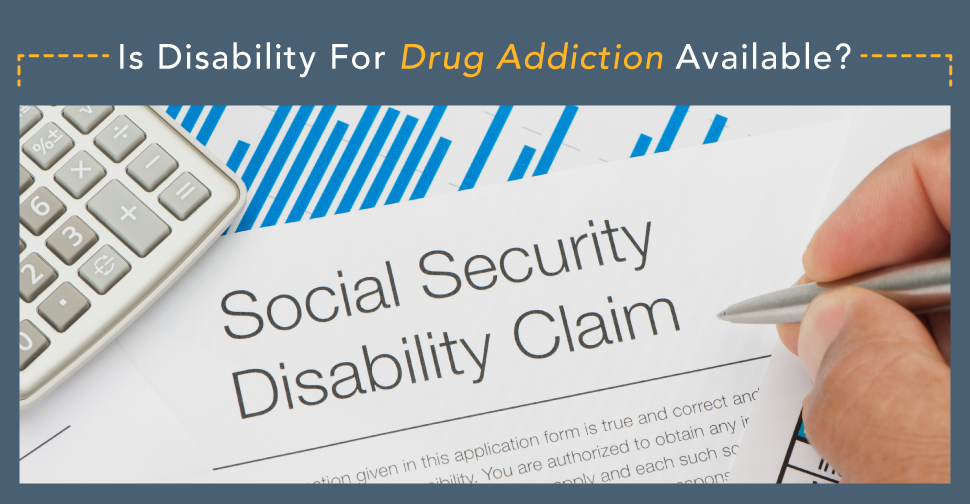
Drug addiction often has a debilitating impact on people who have been using for an extended period of time. It is not uncommon for someone to lose their job, their housing, and relationships that might have otherwise helped support them. This leaves drug-addicted individuals without a safety net, when drugs have taken over their lives.
Disability benefits include cash payments to help offset living expenses as well as health care coverage. Transition coverage is available to those who are able to recover and return to work.
Who Normally Receives Disability Coverage?
As defined by the Social Security Administration, disability refers to an injury or illness that renders you unable to work as you did before, cannot adjust to other work because of your medical condition, or your disability has lasted or is expected to last for at least one year or will result in death.
Disability benefits are granted after the following three specific criteria are met: You may not earn more than $1,070 a month from working, your condition must be expected to last a minimum of 12 months, and your condition must impact your ability to work significantly. Typically, while drug addiction does affect a person’s ability to work, benefits are not extended to the drug-addicted person unless these three primary criteria are first met.
Drug Abuse And Disability Coverage
The Social Security Administration does not normally provide disability coverage for those suffering with drug abuse alone, but does recognize “substance addiction disorders” in their evaluation criteria. In this section, substance addiction disorder is included as it results in behavioral and physical changes associated with a range of mental disorders including anxiety, depression, schizophrenia, and other personality disorders.
Since it is widely known that drug abuse is related to changes in the brain and central nervous system, benefits are extended when an individual who is abusing drugs has at least one correlating health issue or mental disorder.
Health Issues And Mental Disorders Correlating With Drug Abuse:
- Organic Mental Disorders
- Depression Syndrome
- Anxiety Disorder
- Personality Disorder
- Peripheral Neuropathies
- Liver Damage
- Gastritis
- Pancreatitis
- Seizures
Disability Benefits For Drug Addicted Individuals Requires Evidence To Support Claim
When seeking disability benefits as a drug-addicted individual, many areas of your life will be examined and evaluated. Sources of evidence to support your claim of a mental impairment or disorder as a result of drug addiction will require you to support your claim that you have attempted to work, but have not been able to do so due to your addiction or to health issues relating to the addiction. Most importantly, the symptoms of the relating health issue would not disappear upon cessation of the abuse.
A mental status examination may be included, which examines your thought process, behavior, mood, perceptual abnormalities, judgment, and cognition. This may be in conjunction with psychological testing and intelligence tests.
Medical evidence to support the claim, including an assessment of severity that identifies how the abuse affects all aspects of daily living, including tasks like preparing meals and shopping for groceries. It also includes social functioning, or whether or not the drug-addicted person is able to interact appropriately with others for a sustained period of time. The assessment will also examine whether or not the drug abuse impacts a person’s ability to concentrate or keep pace with others in a work environment. Periodic exacerbation of symptoms that require treatment will also be evaluated.
Medical Evidence To Support A Disability Claim For Drug-Addicted Individuals May Include:
- Medical evaluation of ongoing or chronic medical conditions associated with drug abuse and assurance from medical professional that these conditions even with cessation of use of drugs
- Mental status examination
- Psychological testing
- Intelligence testing
- Assessment of severity of symptoms
Due to the complex nature of drug abuse and health issues relating to the abuse, those who apply for disability coverage are often initially denied. This can be discouraging for those seeking help, however the Social Security Administration provides a review process and additional proof may be submitted to support the individual’s claim.
Disability Coverage For Drug-Addicted Individuals
Drug and alcohol addiction can make or break a claim for disability benefits. If alcohol or drugs were a contributing factor to the associated medical condition, a claim may still be processed as long as the condition or disorder is present even after drug use has stopped. If the claim is unrelated, then use of drugs may disqualify you for benefits. For example, if you suffer from a medical condition unrelated to drinking or using drugs and you are unable to work due to the drug addiction and drinking, you will be denied benefits.
Approved Benefits And Treatment For Drug Addiction
If you are approved for disability benefits while abusing drugs, the Social Security Administration will present treatment options and require that a “representative payee” receive payments allocated for bills and other necessities until you have successfully completed a treatment program.
To apply for benefits, you may visit www.ssa.gov and apply online, call the Social Security Administration directly at (800) 772-1213. Or call or visit your local Social Security office.
Help For Drug Addiction Is Here
DrugRehab.org can connect you with treatment options available in your area to help you jump start your recovery and get you back in control of your life today. Contact today for help and information.
For More Information, Be Sure To Check Out These Additional Resources From DrugRehab.org:
- Does Short-Term Disability Cover Drug Rehab?
- What Is A Relapse Prevention Plan?
- The Importance of Aftercare When Leaving A Drug And/Or Alcohol Rehab Program
- How Much Does a Drug and/or Alcohol Intervention Cost?
- How Do I Get My Loved One Into Rehab?

